Search Results
Showing results 201 to 220 of 469
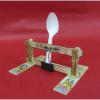
Catapult
Source Institutions
In this activity, learners build mini catapults using paint paddles and a spoon. Use this activity to introduce learners to forces and projectile motion.
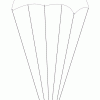
The Parachuting Egg
Source Institutions
In this activity, learners work in groups to design a parachute out of household items that keeps an egg secure when dropped from a certain height.
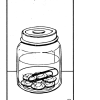
Pollution Diffusion
Source Institutions
Learners design their own experiment to investigate how pollution diffuses through ground material.

Design and Build a Better Candy Bag
Source Institutions
In this activity, learners explore how product design differences can affect the success of a final product -- in this case a bag for holding candy.

Coral Snapshots: Biodiversity in Marine Protected Areas
Source Institutions
In this data activity, learners analyze data from coral reef snapshots taken by scientists at the Virginia Institute of Marine Science.

Paper Cup Stool
Source Institutions
In this activity, learners will explore how and why weight distribution works.
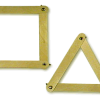
Strong Shapes
Source Institutions
Is a square stronger than a triangle? Use tongue depressors to build simple shapes. Then apply a little weight to them and see what happens!
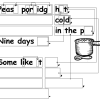
You Can Say That Again!: Text Compression
Source Institutions
This activity helps students learn how computers "compress" text by identifying repeating patterns of letters, words, and phrases.
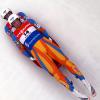
Marble Run!
Source Institutions
This activity (on page 2 of the PDF under SciGirls Activity: Luge) is a full inquiry-based challenge related to motion and design optimization.

Atoms and Matter (K-2)
Source Institutions
In this activity, learners explore atoms as the smallest building blocks of matter. With adult help, learners start by dividing play dough in half, over and over again.

Sound Representation: Modems Unplugged
Source Institutions
In this activity, learners listen to songs and decode hidden messages based on the same principle as a modem. As a final challenge, learners decode the binary messages in a music video.

Boats Afloat
Source Institutions
In this water activity, learners build boats that float and sink. First, learners listen to the book, "Who Sank the Boat" and practice making predictions throughout the story.

Locating a Point
Source Institutions
In this activity, learners work in teams to simulate the process used by Global Positioning Systems (GPS) to determine the location of a fallen meteorite in Antarctica.

Properties of Dust
Source Institutions
In this activity, learners carry out a scientific investigation of dust in their classroom. Learners produce an analysis on graph paper of the dust they collect over the course of a few days.

EEEEK--A Mouse!
Source Institutions
In this activity, learners explore the concept of how engineering solved the problem of human/computer interface.
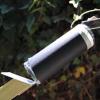
Periscope
Source Institutions
In this activity, learners construct a device that allows them to look over ledges or around corners.
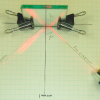
Mirror, Mirror
Source Institutions
In this activity, learners test the Law of Reflection based on experimental evidence. Learners produce raw data and explanations based on their data: pencil tracings of incident and reflection rays.
Build a Bridge
Source Institutions
In this activity, learners use recycled materials to build a bridge that holds as many potatoes as possible. They investigate weight, height, strength, and measurement as they seek design solutions.
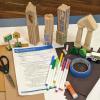
Block Neighborhood
Source Institutions
In this activity learners will build a neighborhood out of blocks and cardboard.
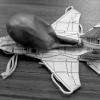
Vectoring: Steering a Plane
Source Institutions
In this two part activity, learners work in pairs or individually to discover how vectoring the thrust from a jet engine affects movement of an airplane.
